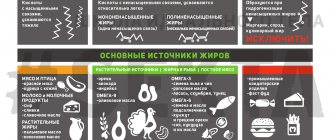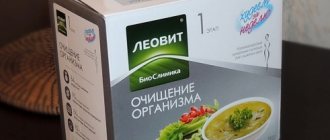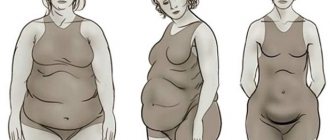Full text of the article:
A healthy lifestyle came into fashion several years ago and is not yet going to lose its position, attracting more and more people to its side. Young people who have given up bad habits and switched to proper nutrition combined with physical activity are especially proud of their commitment to a healthy lifestyle. It's important to understand that healthy habits are only healthy if they're right for you. A proper diet is a balanced diet, and it has almost nothing in common with strict diets. We will tell you how to start writing correctly from scratch and build a nutrition system step by step.
Get a doctor's opinion
In matters of health, the main principle should be the principle of “do no harm,” and without the necessary knowledge, it is very easy to cause serious harm to your health. The Internet is full of “helpful” tips and “tested” recipes, but you need to follow them carefully. At best, such advice will be useless, and at worst, it will land you in a hospital bed. Their main problem is that they are written “for everyone,” i.e. These recommendations do not take into account individual characteristics of a person.
Only a doctor can tell you exactly what nutritional rules you should follow; he will give his recommendations after studying your medical record and personal communication with you. Depending on age, weight, muscle mass, the presence of chronic diseases and other factors, the doctor will give advice on developing a diet and eating regimen. He may prescribe you a diet, advise you to remove certain foods from your diet or, conversely, add certain foods to it. This is necessary to maintain the balance of proteins, fats and carbohydrates in the body. It is especially important for overweight people to stop overeating and start eating right, because excess weight creates a large burden on the entire body.
Consequences of poor nutrition
The likelihood of developing insulin resistance: if a person ignores nutritional standards and his diet is overloaded with simple carbohydrates (sweets, baked goods, etc.), glucose enters the body in large quantities, then constant production of insulin occurs. Glucose often enters the cells, glycogen is formed all the time and when the concentration reaches a peak point, the cells cannot function as well and the expression of insulin receptors on the membrane cells stops. This is how insulin resistance is formed - the cell closes its doors to glucose and ceases to obey the action of insulin. Weight is related to nutritional quality.
In the case described above, excess weight occurs, which provides a favorable environment for many pathologies - stroke, type 2 diabetes, musculoskeletal damage (osteoarthritis), cancer (endometrial, breast and colon cancer). All this causes premature death and permanent disability.
Even with an increase in insulin levels in the blood, “bad” atherogenic low-density cholesterol (LDL) begins to be actively synthesized, which penetrates and builds into the walls of blood vessels, forming plaques. This is how cardiovascular pathology begins.
The body is capable of accumulating a small supply of some vitamins. However, if the intake of vitamins from food is insufficient, these reserves are quickly depleted. Sometimes even with food that is made from foods rich in vitamins, the body lacks them. This happens, for example, with improper cooking of foods, during which a very large part of the vitamin C in them is destroyed (which is why you need to focus on whole, unprocessed plant foods). Finally, even when enough vitamins enter the body with food, they can be poorly absorbed in the intestines due to various diseases of the stomach, intestines and liver. For example, with some liver diseases, little bile enters the intestines, and in the absence of bile acids, the absorption of fat-soluble vitamins A, D, E and K is difficult. That is why, by following general hygienic rules of nutrition and thereby preventing diseases of the digestive organs, we at the same time improve conditions for the absorption of vitamins.
Analyze your regular menu
Would you be surprised if we told you that many people simply don't notice what they eat? Eating is a process that we repeat several times a day, every day. When a person is immersed in other matters and thoughts, he eats almost “automatically,” and while we still notice the main meals, snacks often go unnoticed. There is a danger in this, because snacks mainly consist of “junk” food, the purpose of which is to quickly satisfy a slight hunger or provide momentary pleasure. Therefore, it often contains excess fat or sugar.
Try to conduct an experiment and carefully monitor yourself for at least a week, recording everything you consume. Celebrate even the candy you eat on the go or the tea you drink while watching your favorite TV series. To avoid forgetting anything, keep a “diary”. At the end of the week, review and analyze your records, paying special attention to “junk” and excess food. This will help you control the quantity and quality of snacks in the future.
Develop a balanced menu
The main advantage of a balanced menu is that it does not impose prohibitions. You don't have to give up sweet or fatty foods in favor of lean cereals. It is important that all the foods you eat are systematized and fit into the overall system of distribution of proteins, fats and carbohydrates. The Ministry of Health and WHO recommend maintaining the following proportions in the diet:
- proteins - 10-15%
- fats - 30%
- carbohydrates - 55-60%
It’s quite difficult to figure out all this on your own, especially at the beginning, because we are not used to “counting calories” and don’t know the calorie content of even familiar foods. A nutritionist comes to the rescue. He will teach you how to properly create a menu and take into account the necessary balance.
But it is important not only “what is”, but also “when it is”. It is important that the body receives most of the required daily amount of carbohydrates in the first half of the day, because this is the energy that we can spend on work and performing daily tasks. So, load up on carbs for breakfast and lunch, but remember that not all carbs are created equal. It is better to give preference to slow carbohydrates, which are found, for example, in cereals. These carbohydrates are digested and absorbed slowly, so the feeling of fullness lasts longer, and the person does not need to run for the next portion. Fast carbohydrates, which confectionery products are rich in, are quickly processed, so hunger will not keep you waiting, and with it, extra pounds.
Budget diet for a week
A healthy diet for every day is not as expensive as many people think. With just 1,000 rubles you can purchase groceries for a week, from which you will prepare healthy and wholesome meals for all seven days.
When you go shopping, be sure to buy:
Proteins:
- 1 dozen eggs;
- 1 liter of kefir;
- 300 grams of cottage cheese;
- 5 kg chickpeas;
- 1 kg chicken.
Carbohydrates:
- 1 kg buckwheat;
- 0.5 kg oatmeal;
- 1 kg apples;
- 1 kg bananas;
- 1 kg of oranges;
- 1 kg of white cabbage;
- 1 kg carrots;
- 1 kg frozen green beans.
Fats:
- 0.5 kg mackerel.
Spices, natural baked goods, sweets:
- 300 g honey;
- ground black pepper;
- Provencal herbs;
- turmeric;
- cinnamon;
- pumpkin seeds;
- dried ginger and garlic;
- sesame.
Examples of simple dishes from a budget grocery list
For breakfast:
- oatmeal with apple and cinnamon;
- omelette with green beans;
- smoothie made from kefir, cottage cheese, banana and cinnamon.
For lunch:
- boiled chicken breast with buckwheat and carrot and cabbage salad;
- chickpeas with stewed cabbage and sesame seeds;
- stewed chicken with pumpkin seeds and vegetables.
For dinner:
- chicken fillet with carrot and cabbage salad;
- baked fish with vegetables;
- cottage cheese with pumpkin seeds and kefir.
Ideal snacks include: apples or bananas, a fried egg with bread, a vegetable salad, a sweet salad of apple, honey and carrots.
Choose the “right” sweets
It is most difficult for those with a sweet tooth to follow a certain diet or diet. They cannot completely give up sweets, and if they try to do this, they often “break down,” which can be even more dangerous for the body. Fortunately, proper nutrition does not imply a complete exclusion of sweets. It is only important to choose the right source of pleasure and switch to sweets that contain natural sugar. These are fruits, berries, nuts and homemade dried fruit candies. Natural sugar is better absorbed and will not contribute to weight gain as much as sugar used in confectionery production. But if you cannot completely give up cakes and pastries, then supplement them with your main meal, so you can limit yourself to a small portion and satisfy your need for sweets. But it’s better to pamper yourself in the first half of the day, since the carbohydrates that entered the body after lunch will not have time to be used up and will be deposited in adipose tissue.
Nutritional standards developed by the Institute of Nutrition of the Russian Academy of Medical Sciences
One of the documents establishing the norms of physiological needs for energy and nutrients for various groups of the population of the Russian Federation are the methodological recommendations of the Federal Center for Hygiene and Epidemiology of Rospotrebnadzor, developed in 2008 with the direct participation of specialized specialists from such scientific centers as the State Research Institute of Nutrition of the Russian Academy of Medical Sciences , Scientific Center of Health of the Russian Academy of Medical Sciences, Moscow Medical Academy named after. I. M. Sechenova, Institute of Medical and Biological Problems of the Russian Academy of Sciences, Russian Medical Academy of Postgraduate Education of the Ministry of Health of Russia, etc.
According to the information given in the document, the daily requirement for macronutrients, vitamins and minerals is:
| Nutrient | Adults | Children |
| Protein | 65-117 g for men 58-87 g for women | Up to 1 year – 2.2-2.9 g per 1 kg Over 1 year – 36-87 g |
| Fats | 70-154 g for men 60-102 g for women | Up to 1 year – 5.5-6.5 g per 1 kg Over 1 year – 40-97 g |
| Carbohydrates | 257-586 g | Up to 1 year – 13 g per 1 kg Over 1 year – 170-420 g |
| Cellulose | 20 g | Over 3 years – 10-20 g |
| Vitamin C | 90 mg | 30-90 mg |
| Vitamin B1 | 1.5 mg | 0.3-1.5 mg |
| Vitamin B2 | 1.8 mg | 0.4-1.8 mg |
| Vitamin B3 | 20 mg | 5-20 mg |
| Vitamin B5 | 5 mg | 1-5 mg |
| Vitamin B6 | 2 mg | 0.4-2 mg |
| Vitamin B7 | 50 mcg | 10-50 mcg |
| Vitamin B9 | 400 mcg | 50-400 mcg |
| Vitamin B12 | 3 mcg | 0.3-3 mcg |
| Vitamin A | 900 mcg | 400-1000 mcg |
| Vitamin E | 15 mg | 3-15 mg |
| Vitamin D | 10 mcg 15 mcg for persons over 60 years of age | 10 mcg |
| Vitamin K | 120 mcg | 30-75 mcg |
| Calcium | 1000 mg 1200 mg for persons over 60 years of age | 400-1200 mg |
| Phosphorus | 800 mg | 300-1200 mg |
| Magnesium | 400 mg | 55-400 mg |
| Potassium | 2500 mg | 400-2500 mg |
| Sodium | 1300 mg | 200-1300 mg |
| Chlorides | 2300 mg | 300-2300 mg |
| Iron | 10 mg for men 18 mg for women | 4-18 mg |
| Zinc | 12 mg | 3-12 mg |
| Iodine | 150 mcg | 60-150 mcg |
| Copper | 1 mg | 0.5-1 mg |
| Manganese | 5 mg | 2 mg |
| Selenium | 70 mcg for men 55 mcg for women | 10-50 mcg |
| Chromium | 50 mcg | 11-35 mcg |
| Molybdenum | 70 mcg | |
| Fluorine | 4 mcg | 1-4 mg |
Learn to count calories
Sooner or later you will have to learn to control the calories you consume. It may be difficult at first, but then it will become a habit. You will remember the approximate caloric content of the main products of your diet and can easily maintain balance. If you lead an active lifestyle with regular physical activity, then the calorie content of your daily diet may be higher, and if you don’t move much, then reduce the amount of calories you consume. When determining your individual norm, you can follow the recommendations of the Ministry of Health: 2400 kcal for men and 2200 kcal for women.
Dietary supplements and vitamins
Advertising for dietary supplements follows us everywhere, and every manufacturer claims that supplements are simply necessary for a normal life, while Russian residents do not receive some natural vitamins. To some extent, this is true, iodine and vitamin D deficiency is indeed common, but this is not a reason to abuse supplements. What is characteristic of “many” is not necessarily characteristic of you personally. A real deficiency of some microelement can be shown by a blood test, and the deficiency can be caused not only by an incorrect diet, but also by the presence of a disease. The same can be said about an excess of microelements. In this case, dietary supplements will only worsen the situation.
Do not try to prescribe “treatment” for yourself, this is the doctor’s task. Even if you purchase over-the-counter medications, you are responsible for how they affect your body. Proper nutrition is a system, not a lottery, so you need to build it from the basics and wisely, guided not by the opinion of the majority, but by the advice of experts.
List of functional foods
- High antioxidant content
- brightly colored fruits (for example, orange, papaya) and vegetables (for example, bell peppers, cruciferous vegetables like broccoli or Brussels sprouts, sweet potatoes, carrots) greens, berries (for example, goji, acai, raspberries, cranberries, blueberries, etc. ).
- Green products
- Herbs and seafood (spirulina, chlorella, wheatgrass, barley and others) are full of phytonutrients, vitamins and minerals, some of which are difficult to obtain from other plant foods.
- High fiber foods
– all types of vegetables, fresh fruits, coconuts, avocados, legumes, whole grains, nuts and seeds.
- Probiotic Products
- these are fermented foods (yogurt, kefir, sauerkraut, kvass, kombucha and others).
- Prebiotics
- leeks, onions, garlic, bananas, potatoes, asparagus, artichokes, beans, whole grains and many other plant foods. Eating a raw, plant-based diet is one of the best ways to get more prebiotics as well as digestive enzymes that support normal nutrient absorption levels.
- Omega-3 Rich Foods
- wild fish (salmon, sardines, mackerel, halibut), as well as walnuts, chia and flax seeds.
- Nuts and seeds
—almonds, cashews, flax, chia, hemp, walnuts and others.
- Teas, herbs and spices
- green tea, black tea, turmeric, ginger, parsley, cinnamon, etc. Fresh herbs/spices help flavor dishes without adding extra calories. They also have anti-inflammatory, often antimicrobial properties. Red wine, dark chocolate, cocoa and coffee can also be considered functional foods due to their high levels of antioxidants and phytonutrients.
- Bone broth
- rich in amino acids (glycine, arginine and proline), vitamins and minerals, collagen, electrolytes, antioxidants (glucosamine).
We recommend
“Micronutrient deficiency and its impact on health” Read more










